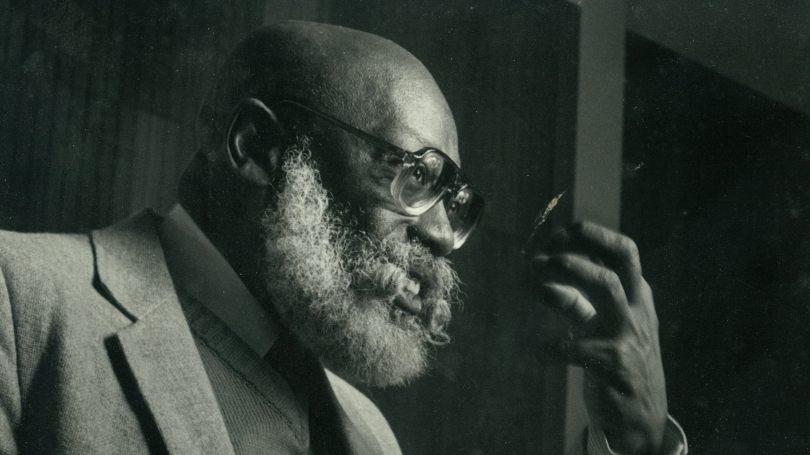
- Undergraduate
- Foreign Study
- Research
- News & Events
- People
Back to Top Nav
Back to Top Nav
Back to Top Nav
William W. Cook died on Monday, May 15, 2017 in Lebanon, New Hampshire. He was the Israel Evans Professor of Oratory and Belles Lettres Emeritus at Dartmouth College, where he also served as chair of the Departments of English and African and African American Studies.
He was born the son of the Reverend Cleve Cook and Frances Cook in Trenton, New Jersey, on August 4, 1933. Bill graduated at the head of his high school class in Trenton and was the Valedictorian of his class at Trenton State College (now the College of New Jersey), where he majored in English. He went on to teach English and Drama in Princeton’s public high school and soon built a reputation as an outstanding teacher, not only in the state of New Jersey, but in nation-wide surveys, where he was recognized as one of the most effective educators of his generation.
In 1973, Bill joined the Dartmouth faculty, where he would teach for over 30 years. He brought to Hanover the wide-ranging integrative approach to literature that he had developed early in his career. The nascent African and Afro-American Studies program was just starting, and Bill helped to shape and promote its offerings, first as chair of the steering committee and later as a two-time chair of the program. At Dartmouth, Bill gained a reputation as one of our finest teachers. In addition to chairing his department and program, Bill served on all of the important governing councils and committees at the College, including a long stint on the Committee Advisory to the President. In that capacity, he provided institutional memory to the Presidencies of John Kemeny, David McLaughlin, James Freedman, and James Wright.
Bill was made President and national Chair of such professional organizations as the National Council of Teachers of English and the Conference on College Communication and Composition. He was in the first cohort of nationally prominent educators who were selected by Senator Dale Bumpers to lead the Mississippi Delta Teaching Project, a program that aimed to help teachers and students in some of the poorest parts of the country.
One of Bill’s loves was to teach beginning poetry to both general students and those with aspirations to become poets. This calling was inspired by his commitment to his own poetry, which he published frequently in poetry magazines and gathered in Hudson Hornet: Collected Poems (1989) and Spiritual: Selected Poems (1999). Bill’s second love was the theater. In 1998, he helped to found the African Grove Institute for the Arts in the wake of his Summit at Golden Pond, held at Dartmouth. The subsequent National Black Theatre Summit grew out of Bill’s collaboration with the playwright August Wilson, which began when Wilson was at Dartmouth as a Montgomery Fellow.
Together with his friend and Dartmouth colleague in Classics, James Tatum, Bill directed many productions of Tatum’s translations of the Roman comic poet Plautus. They also created a performance piece, “Black Talk, Black Tunes,” in which they performed African American poetry and the ragtime music of Scott Joplin and his contemporaries. This performance was perfected into a production entitled “The Aim Was Song,” whose goal was to underscore the qualities in poetry that link it so closely to the sounds of music. Over a period of more than twenty years, Bill and Jim also collaborated in a course on African American poets and writers and the poets of ancient Greece and Rome, a collaboration which culminated in their 2010 book African American Writers and Classical Tradition, published by the University of Chicago Press, which won the American Book Award for 2011.
Bill Cook was widely known for his wit and his talents as an illustrator and artist. Family, friends, and colleagues soon learned to look forward to his joke greeting cards that were the product of his satiric eye and clever pen. A funeral was held in Trenton on Friday, May 19, with a memorial service to be held on July 15, 2017 beginning at 2:30 PM in Rollins Chapel. A reception will follow at the Top of the Hop, Hopkins Center.